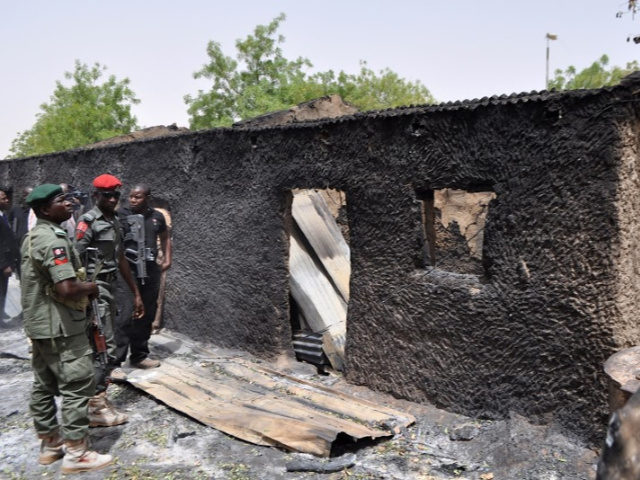T, Belman. If you want to conquer a country and change its culture to yours, look to Islam.
Boko Haram jihadis have set ablaze a total of 1,125 churches and other religious structures belonging to just one Christian denomination in Nigeria since the terrorist group launched an uprising for Islamist rule in the African country in 2009, Rev. Joel Billi, the leader of the victimized group known as the Church of the Brethren in Nigeria, reportedly revealed this week.

Also known as the Ekklesiyar Yan’uwa A Nigeria (EYN) in the Hausa language, the Christian group primarily resides in northeastern Nigeria, home to Boko Haram’s birthplace and primary stronghold.
According to the Daily Post, Billi is urging Nigeria’s federal government to help EYN rebuild the church branches razed by Boko Haram terrorists since 2009.
Daily Post reported:
The EYN says Boko Haram has destroyed a total of 1,125 of its church buildings and other structures over the years of insurgency. These include its headquarters office complex, which has been rebuilt, a church auditorium which is yet to be fully reconstructed, and an adjacent pastor’s residential quarters where reconstructions work is yet to start.
The reverend reportedly expressed anger as he discussed the destruction of his group’s worshiping centers on Tuesday during the 2019 Ministers’ Annual Conference at the EYN headquarters in northeastern Nigeria’s Adamawa state.
He proclaimed:
For how long are we going to wait in vain? We are tired of fictitious promises. Are worship places not included in the rebuilding of the Northeast? Is Adamawa State excluded from the rebuilding of the Northeast? Why are we flagrantly neglected as if we deserve to be punished? If not for the inadequacy of our security forces and political undertone, Boko Haram would not have overrun us. So, why do we pay for the sin that was not committed by us?
Christians, who mainly reside in the southern part of the country, make up nearly half (about 47 percent) of the population of Muslim-majority Nigeria.
The latest World Watch List (WWL) by Open Doors, a group that monitors the mistreatment of followers of Jesus Christ across the globe, recently designated Nigeria (12th) as one of the top 15 worst countries for Christian persecution.
“In parts of northern Nigeria, Christians are treated as second-class citizens. Christians from Muslim backgrounds face persecution from their own families,” the monitoring group noted.
Some Boko Haram jihadis pledged allegiance to the Islamic State (ISIS/ISIL) in 2015, and in recent years, an ISIS-linked Boko Haram offshoot has been wreaking havoc in Nigeria, targeting Christians.
“Islamic State West Africa Province (ISWAP), a deadly group that broke away from Nigeria’s Boko Haram … also enslaves Christian women and girls as an integral part of their strategy,” Open Doors noted.
While Boko Haram remains a threat against Christians, Muslim Fulani herdsmen in Nigeria’s Middle Belt region have surfaced as some of the most lethal menaces facing followers of Christ in the African country.
Last month, Dr. Benjamin Argak Kwashi, the bishop of the Anglican Diocese of Jos and archbishop of the Ecclesiastical Province of Jos in the Church of Nigeria, told Breitbart News that Fulani herdsmen represented a “bigger threat” to Christians than Boko Haram.
Echoing the bishop, Open Doors noted, “Nigeria’s score for violence has stayed as high as possible, primarily due to the increased attacks on Christian communities by militant Fulani herdsmen. These attacks claimed the lives of hundreds of believers during the reporting period, and villages and churches burned to the ground.”
Muslim-majority Fulani herdsmen and predominantly Christian farmers are clashing over access to land and other resources.
In April 2018, the Christian Association of Nigeria (CAN) urged followers of Christ to rise and defend themselves, arguing that the capabilities of Boko Haram, herdsmen, and other groups exceed that of the nation’s security forces.
Members of CAN reportedly attended Tuesday’s conference in Adamawa state.



An equally horrific human rights situation exists in West Papua, where the Islamic INdonesian regime is perpetrating horrific massacres of the indigenous black, mainly Christian population. This racist genocide has been in progress since Indonesia illegally seized West Papua back in 1965, with the complicity of the United States, the UN, and the whole world. From Arutz Sheva today: